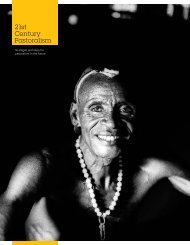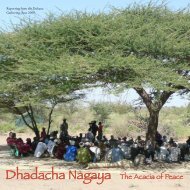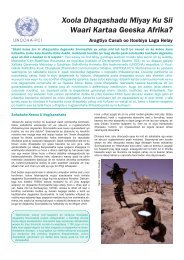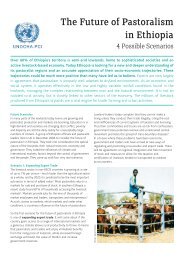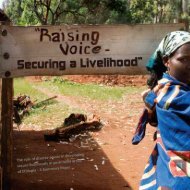Download PDF (1.47Mb) - the Website of the Pastoralist ...
Download PDF (1.47Mb) - the Website of the Pastoralist ...
Download PDF (1.47Mb) - the Website of the Pastoralist ...
You also want an ePaper? Increase the reach of your titles
YUMPU automatically turns print PDFs into web optimized ePapers that Google loves.
Introduction<br />
Welcome to <strong>the</strong>se pages. They describe an approach to action research used by a group <strong>of</strong> young people in<br />
Karamoja, Uganda. With guidance from experienced facilitators, 13 young people researched <strong>the</strong> situation <strong>of</strong><br />
youth in <strong>the</strong>ir area over a period <strong>of</strong> 5 weeks in November/December 2011 1 . They published <strong>the</strong>ir findings in a<br />
book that should be read alongside this document on method. ‘Strength, Creativity and Livelihoods <strong>of</strong> Karimojong<br />
Youth’ can be downloaded from www.restlessdevelopment.org or from www.pastoralists.org.<br />
These pages explain <strong>the</strong> basic principles we used. We are not holding up <strong>the</strong> work as a flawless example. We had<br />
to deal with many <strong>of</strong> <strong>the</strong> usual problems that beset genuine attempts to promote people’s research into <strong>the</strong>ir<br />
own issues and on <strong>the</strong>ir own terms; including <strong>the</strong> questions <strong>of</strong> who commissions and who pays, how pressed<br />
everyone is for time and resources, and how ordinary people, who are not supposed to know how to do research,<br />
might suddenly take up <strong>the</strong> task with confidence and make use <strong>of</strong> facilitators without being dominated by <strong>the</strong>m.<br />
The biggest issue <strong>of</strong> all is who takes action – who is it for?<br />
The idea <strong>of</strong> action research is to recognise that <strong>the</strong>se kinds <strong>of</strong> limitation always exist, and to produce truthful<br />
research that is useful to local communities and to outsiders despite <strong>the</strong> inevitable imperfections. This is done<br />
through being rigorous at every stage. Action research may appear relaxed but in truth it is not; it is done carefully<br />
and it sticks to its principles like glue. These pages aim to illustrate this cardinal point.<br />
The first principle <strong>of</strong> action research is an equal level <strong>of</strong> respect for <strong>the</strong> researched and <strong>the</strong> researcher. It means<br />
that those who take part in it are <strong>the</strong> ones to design it. They must find ways to research that fit <strong>the</strong>ir constituency,<br />
questions and context. So, in <strong>the</strong>se pages we do not give a method, tools or techniques, ra<strong>the</strong>r we explain effective<br />
principles put into practice in a given situation. If you are interested to apply action research principles to your<br />
own inquiries, in a way that answers your questions and fits with your situation, you may find some pointers from<br />
our experience.<br />
1<br />
The research was facilitated by <strong>the</strong> <strong>Pastoralist</strong> Communication Initiative with advice from <strong>the</strong> Institute<br />
<strong>of</strong> Development Studies (UK). It was commissioned and supported by <strong>the</strong> youth-led development agency Restless<br />
Development Uganda. It was funded by UNFPA and UK DFID.<br />
- 2 -



